- Joined
- Aug 15, 2019
- Messages
- 7,493
- Reaction score
- 143
- Points
- 63
In The Mode For Love
[Time Out, 4th April 2001. Words: Sat Bisla. Pictures: Uncredited.]
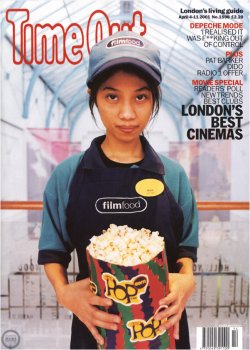
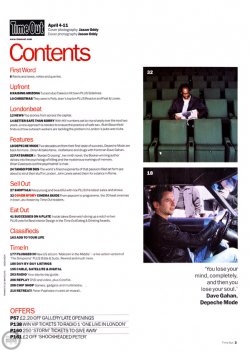
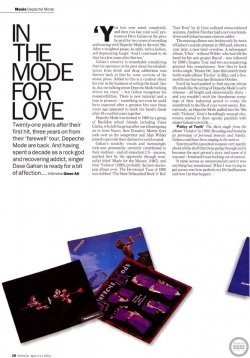
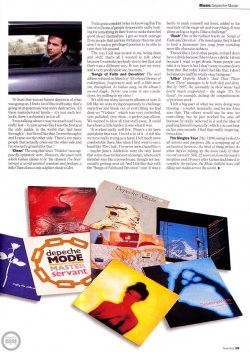
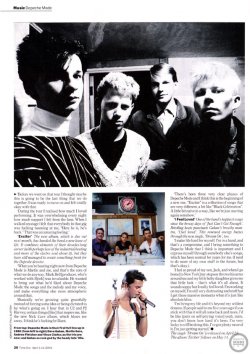
"You lose your mind, completely, and then you lose your soul," pronounces Dave Gahan on the price he paid for two years of recording and touring with Depeche Mode in the mid-'90s. After a weighted pause, he adds, with a hollow, self-deprecating laugh, "And I continued to do that for a few years after that too."
Gahan's sincerity is remarkable considering that his openness in the past about his rehabilitation from drink and drugs was thrown back at him by some sections of the music press. Added to this is a candour about his role in the business of selling the band: "day in, day out talking about Depeche Mode fucking drives me crazy' - but Gahan recognises his responsibilities. There is new material and a tour to promote - something not even he could have expected after a greatest hits tour three years ago appeared to mark the band's finale after 18 eventful years together.
Depeche Mode was formed in 1980 by a group of Basildon school friends including Vince Clarke, who left the group after one album (going on to form Yazoo, then Erasure). Martin Gore took over as the songwriter and Alan Wilder joined to provide their distinctive synth sound.
Gahan's scratchy vocals and increasingly rock-star personality certainly contributed to their stadium - and all-important US - success, marked first by the appositely (though ironically) titled 'Music for the Masses' (1987), and then 'Violator' (1990), probably the best electro-pop album ever. The Devotional Tour of 1993 was dubbed "The Most Debauched Rock'n'Roll Tour Ever" by Q. Gore suffered stress-induced seizures, Andrew Fletcher had a nervous breakdown and Gahan became a heroin addict.
The ensuing silence was broken only by news of Gahan's suicide attempt in 1995 and, almost a year later, a near-fatal overdose. A subsequent album, 'Ultra' - without Wilder, who had left the band for his solo project Recoil - was followed by 1998's Singles Tour and two accompanying greatest hits compilations. Now they're back with a single, 'Dream On', later this month; their tenth studio album 'Exciter' in May; and a five-month tour that reaches Britain in October.
You'd be hard-pushed to find anyone whose life reads like the string of Depeche Mode's early releases - all bright and electronically shiny - and you wouldn't wish the thunderous scrapings of their industrial period to evoke the soundtrack to the life of your worst enemy. But, curiously, as Depeche Mode pulled into the '90s with 'Violator', Gore's broodingly sensual electronica started to draw spooky parallels with singer Gahan's own life... [1]
'Policy of Truth' The third single from the album 'Violator' in 1990. Brooding and brutal in its portrayal of personal honesty and fidelity, Gahan could have been singing to the mirror.
"I put myself in a position to speak very openly about all the stuff that I was going through and it becomes the next person's story and some of it was sad - I realised it was fucking out of control.
"It came across as sensationalism and it was anything but sensational. What I was trying to get across was how pathetic my life had become and how I let that happen.
"At least that was an honest depiction of what was going on. I find a lot of this stuff today that's going on in pop music way more destructive. All these manufactured bands - it's just such bollocks, there's no honesty in it at all.
"I was talking about it way too much and I was really lost - it came across like I was the first and the only junkie in the world that had been through it - but I lived like that. I went through it and I came out the other side. There's not many people that actually come out the other side and I'm eternally grateful for that." [2]
'Clean' The song that closes 'Violator' on a supposedly optimistic note. However, the snarl with which Gahan claims to be "the cleanest I've been" betrays a world-wearied cynicism and perhaps a belief that clean is only a lighter shade of dirt.
"I take great comfort today in knowing that I'm one of millions of people desperately sadly looking for someone in their lives to make them feel good about themselves. I get so much courage from people that are less fortunate than me and aren't in such a privileged position to be able to turn their life around.
"The way I felt was so new to me, being clean and stuff, that's all I wanted to talk about because I wanted everybody else to feel that and there was a different way. It was just my story and a very predictable one, but mine."
'Songs of Faith and Devotion' The next album released in March of '93 echoed the themes of redemption, forgiveness and, well, a little more sin, throughout. As Gahan sang, on the album's second single, "before you come to any conclusions, try walking in my shoes".
"It's still one of my favourite albums of ours. It felt like we were trying desperately to challenge ourselves and break out of everything we had done on 'Violator', which was very controlled, very polished, very clean - a perfect pop album. We wanted to blow all that stuff away. It could have been a little harder; it was what it was.
"It worked really well live. There's a lot been said about that tour. I loved a lot of it - it felt like we were really trying as a band. I felt much more comfortable there, like when I first went to see a band like The Clash. I've never seen a band like it - maybe Jane's Addiction were the only band that come close to that sort of energy, where each member was like a powerhouse, though not necessarily getting on at all. And I felt like that with the 'Songs of Faith and Devotion' tour. It was a battle to push yourself out front, added to the enormity of the stage set and everything. It was about as big as it gets. I like a challenge."
'Rush' One of the rockiest tracks on 'Songs of Faith and Devotion'. The band again find it hard to keep a passionate love song from sounding more like obsessive sickness. [3]
[Time Out, 4th April 2001. Words: Sat Bisla. Pictures: Uncredited.]
Unusual article using Depeche's releases as snapshots to trace the band's history while Dave reflects. Factually, there's nothing wrong with it, but Dave's musings colour the article a bit too heavily, and in some places the author seems to bend over backwards to draw a particular interpretation out of the band's story. If you are new to the band, please read around.
" It came across as sensationalism and it was anything but sensational. What I was trying to get across was how pathetic my life had become and how I let that happen. "





"You lose your mind, completely, and then you lose your soul," pronounces Dave Gahan on the price he paid for two years of recording and touring with Depeche Mode in the mid-'90s. After a weighted pause, he adds, with a hollow, self-deprecating laugh, "And I continued to do that for a few years after that too."
Gahan's sincerity is remarkable considering that his openness in the past about his rehabilitation from drink and drugs was thrown back at him by some sections of the music press. Added to this is a candour about his role in the business of selling the band: "day in, day out talking about Depeche Mode fucking drives me crazy' - but Gahan recognises his responsibilities. There is new material and a tour to promote - something not even he could have expected after a greatest hits tour three years ago appeared to mark the band's finale after 18 eventful years together.
Depeche Mode was formed in 1980 by a group of Basildon school friends including Vince Clarke, who left the group after one album (going on to form Yazoo, then Erasure). Martin Gore took over as the songwriter and Alan Wilder joined to provide their distinctive synth sound.
Gahan's scratchy vocals and increasingly rock-star personality certainly contributed to their stadium - and all-important US - success, marked first by the appositely (though ironically) titled 'Music for the Masses' (1987), and then 'Violator' (1990), probably the best electro-pop album ever. The Devotional Tour of 1993 was dubbed "The Most Debauched Rock'n'Roll Tour Ever" by Q. Gore suffered stress-induced seizures, Andrew Fletcher had a nervous breakdown and Gahan became a heroin addict.
The ensuing silence was broken only by news of Gahan's suicide attempt in 1995 and, almost a year later, a near-fatal overdose. A subsequent album, 'Ultra' - without Wilder, who had left the band for his solo project Recoil - was followed by 1998's Singles Tour and two accompanying greatest hits compilations. Now they're back with a single, 'Dream On', later this month; their tenth studio album 'Exciter' in May; and a five-month tour that reaches Britain in October.
You'd be hard-pushed to find anyone whose life reads like the string of Depeche Mode's early releases - all bright and electronically shiny - and you wouldn't wish the thunderous scrapings of their industrial period to evoke the soundtrack to the life of your worst enemy. But, curiously, as Depeche Mode pulled into the '90s with 'Violator', Gore's broodingly sensual electronica started to draw spooky parallels with singer Gahan's own life... [1]
'Policy of Truth' The third single from the album 'Violator' in 1990. Brooding and brutal in its portrayal of personal honesty and fidelity, Gahan could have been singing to the mirror.
"I put myself in a position to speak very openly about all the stuff that I was going through and it becomes the next person's story and some of it was sad - I realised it was fucking out of control.
"It came across as sensationalism and it was anything but sensational. What I was trying to get across was how pathetic my life had become and how I let that happen.
"At least that was an honest depiction of what was going on. I find a lot of this stuff today that's going on in pop music way more destructive. All these manufactured bands - it's just such bollocks, there's no honesty in it at all.
"I was talking about it way too much and I was really lost - it came across like I was the first and the only junkie in the world that had been through it - but I lived like that. I went through it and I came out the other side. There's not many people that actually come out the other side and I'm eternally grateful for that." [2]
'Clean' The song that closes 'Violator' on a supposedly optimistic note. However, the snarl with which Gahan claims to be "the cleanest I've been" betrays a world-wearied cynicism and perhaps a belief that clean is only a lighter shade of dirt.
"I take great comfort today in knowing that I'm one of millions of people desperately sadly looking for someone in their lives to make them feel good about themselves. I get so much courage from people that are less fortunate than me and aren't in such a privileged position to be able to turn their life around.
"The way I felt was so new to me, being clean and stuff, that's all I wanted to talk about because I wanted everybody else to feel that and there was a different way. It was just my story and a very predictable one, but mine."
'Songs of Faith and Devotion' The next album released in March of '93 echoed the themes of redemption, forgiveness and, well, a little more sin, throughout. As Gahan sang, on the album's second single, "before you come to any conclusions, try walking in my shoes".
"It's still one of my favourite albums of ours. It felt like we were trying desperately to challenge ourselves and break out of everything we had done on 'Violator', which was very controlled, very polished, very clean - a perfect pop album. We wanted to blow all that stuff away. It could have been a little harder; it was what it was.
"It worked really well live. There's a lot been said about that tour. I loved a lot of it - it felt like we were really trying as a band. I felt much more comfortable there, like when I first went to see a band like The Clash. I've never seen a band like it - maybe Jane's Addiction were the only band that come close to that sort of energy, where each member was like a powerhouse, though not necessarily getting on at all. And I felt like that with the 'Songs of Faith and Devotion' tour. It was a battle to push yourself out front, added to the enormity of the stage set and everything. It was about as big as it gets. I like a challenge."
'Rush' One of the rockiest tracks on 'Songs of Faith and Devotion'. The band again find it hard to keep a passionate love song from sounding more like obsessive sickness. [3]
[1] - What comes next illustrates my point about forcing interpretations: while many people over the years have asked if Martin writes for Dave deliberately, I have never seen anyone put so much effort into trying to prove it. Umpteen other articles on Sacred DM ought to balance the argument.
[2] - This is the only article from 1998 I have seen where Dave is still in 'confessional mode', and what is worrying is that he seems to alternate between beating himself up about doing drugs, and beating himself up about his previous confessionals about doing drugs. It leads me to wonder if here again the author may have given the article a bit of a spin by how he quoted Dave's words.
[3] - It was almost certainly intentional: obsessive sickness and chemical addiction sounding more like a passionate love song than vice versa - and one remix was called the Amylnitrate Mix.
